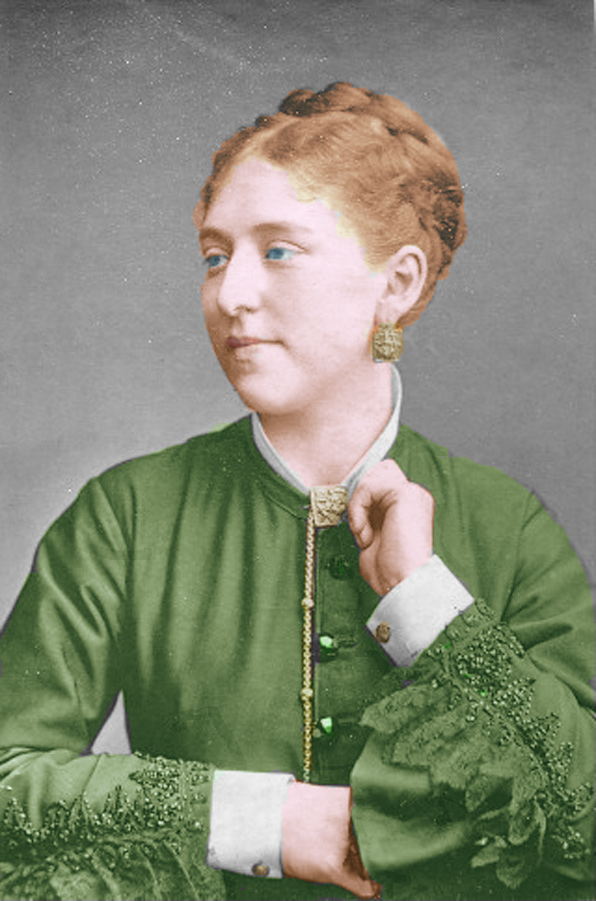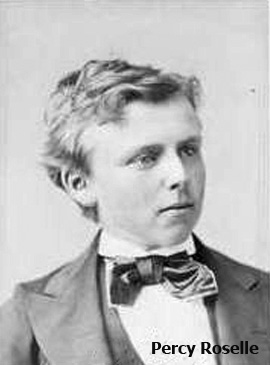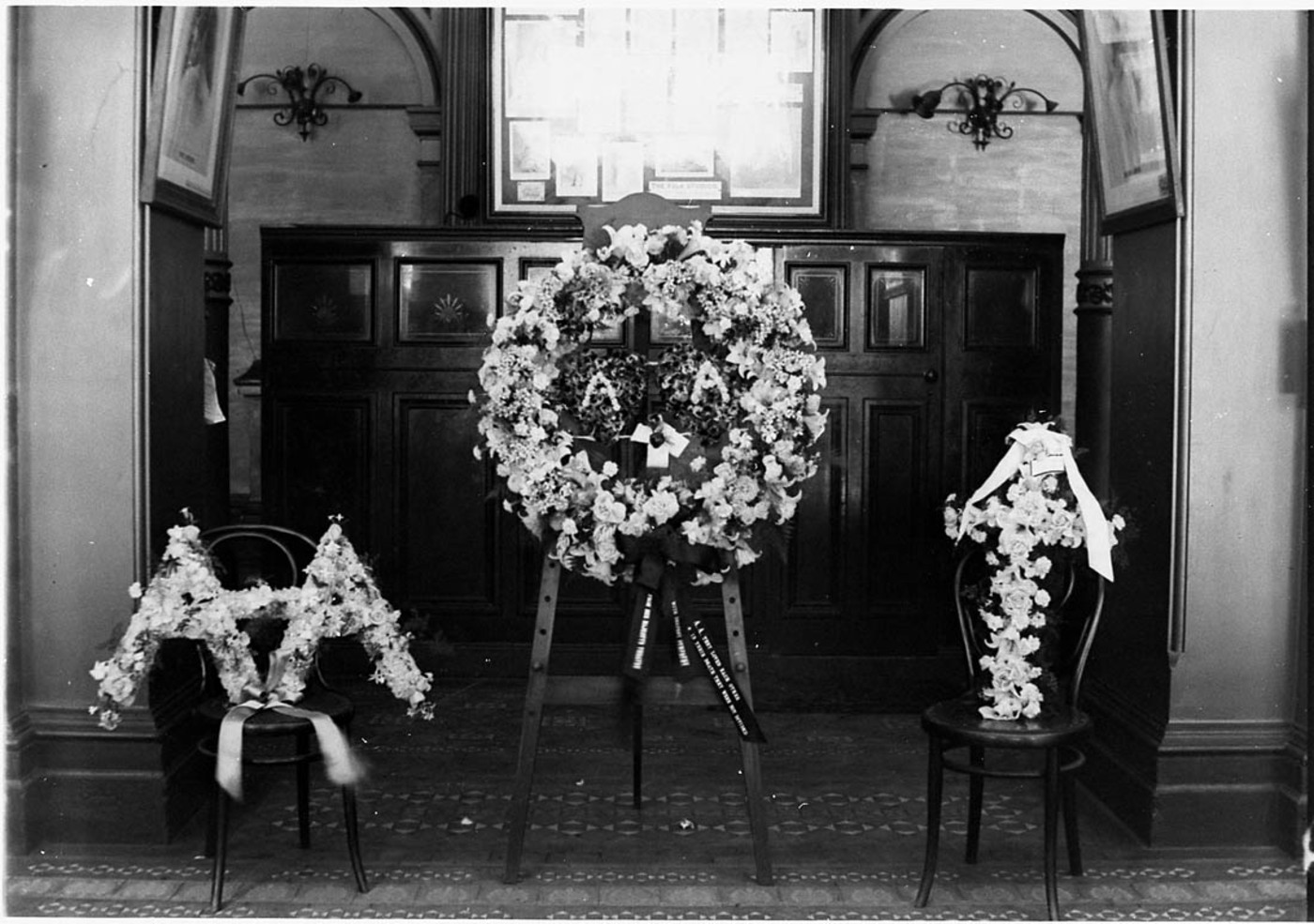Amy Roselle
The story of Amy Roselle and Arthur Dacre

Amy Roselle was born Amy Louise Hawkins in 1852 the youngest of twelve children of the headmaster of the Glastonbury Grammar School William Hawkins. Her brother Percy was a dwarf and played children's parts into adulthood in pantomimes at the Theatre Royal, Drury Lane as "Master Percy Roselle".

Her first role, as a juvenile, was Constance in a version of King Arthur. After this, her father leased the Cardiff and Swansea theatres for two years. At these theatres, Roselle played in Shakespeare and other productions. She debuted in London at the Haymarket Theatre. There, at age 16, she played Lady Teazle and then, opposite Samuel Phelps, numerous leading parts. She replaced Madge Kendal in Diplomacy and played Esther Eccles in Caste, by T. W. Robertson. She appeared opposite Mary Anderson as Cynisca in Pygmalion and Galatea by W. S. Gilbert and created the role of Darine in Gilbert's The Wicked World in 1873. She also performed at the Adelphi Theatre and other London theatres. In 1875, she created the role of Mary Melrose in the sensation Our Boys, which was the longest-running play in history up to that time.

Roselle toured the United States with E. A. Sothern, appearing in New York at Niblo's Garden. She then returned to England and starred as Lady Macbeth opposite Henry Irving at the Lyceum Theatre, London, during the illness of Ellen Terry. She also played Queen Katherine of Aragon in Henry VIII at the Lyceum. Roselle appeared in the title role of Esther Sandraz at the Prince of Wales's Theatre and created the role of Lillian in Old Love for New.[2] In 1881, she originated the role of Mrs. Blythe in F. C. Burnand's long-running comedy, The Colonel.

During a long engagement at the Royal Court Theatre, she met doctor-turned-actor Arthur Culver James (stage name Arthur Dacre), and the two eventually married around 1881. Roselle was in more demand than her husband, but the two insisted on being engaged jointly. For several years, they toured together in the British provinces, but eventually they had trouble getting a joint engagement and, out of work, ran up debts. A benefit performance was held for Roselle at the Lyceum Theatre on 16 June 1887, at which Trial by Jury was performed. Eventually Roselle and Dacre travelled to Australia where they played in Melbourne, Adelaide, Sydney (at Her Majesty's Theatre) and elsewhere. They did not succeed in paying off their debts, however,
and became despondent. They committed suicide together in Australia in 1895. Dacre shot Roselle, but ran out of bullets and had to cut his own throat.
Amy and Arthur Dacre 1895
In the 19th Century, many English actors came to Australia hoping to earn fame and fortune. In 1895, Amy and Arthur James, better known as Amy Roselle and Arthur Dacre, arrived in the country. They had been suffering bad luck in England and thought that they could recoup their losses in the colony. Amy and Arthur saw Australia as their salvation. Amy was the more famous of the two. Aged forty, she was recognised in England as a leading lady. Her greatest triumph had been a performance opposite Henry Irving as Lady Macbeth in 1891. She was an actress from the old school, artificial and melodramatic on stage. Off stage she was loved for her gentle, courageous disposition and even temper. She was a full bodied woman with a square face and prominent features. She was devoted to her husband and the pair were well known for their affectionate embraces.
Arthur Dacre was less renowned. Originally trained as a physician, he took up acting late in life. He was an excitable, nervous man of forty five, who believed that his talent had not been adequately recognised. He was a complainer, but also a generous honest man who took his responsibilities seriously. He had a serious, rectangular face, with a long nose and deeply sunk eyes above a neatly trimmed moustache. On stage he was naturalistic and had a distinguished air. He was a competent but not spectacular actor.
Arthur and Army had been married for fourteen years when they arrived in Australia. Some years earlier they had lost their only child. Arthur carried a photo of the three of them and the pair travelled everywhere with the baby’s bible
Their Australian tour did not fare as well as expected. The critics were kind, but the audiences were not. In June 1895 they presented the play "Esther Sandraz" at Her Majesty’s in Sydney. The Sydney Morning Herald critic did not like the play but praised Amy for her ‘incisive tones’. Arthur was also commended for his ‘sound’ and ‘convincing’ work. Yet audiences were not convinced and stayed away from the Dacre season in Sydney
Amy and Arthur took their plays to Melbourne and Adelaide. In both cities they played to poor houses and for limited runs. They had a particularly difficult time in Melbourne and by the time they returned to Sydney in October 1895 were dispirited and disappointed. Both were feeling concerned with the plight of those who had accompanied them to Australia. The situation of Miss Hardy, a member of their company, unable to return to England due to lack of funds, weighed heavily on their consciences.
Yet, business began to improve. Their performance in "The Land of Moa" was again critically praised. This time the audience agreed with the assessment. The performances were well received and large houses and liberal applause greeted the Dacres every night. So successful was this season, that Theatre Royal management engaged them for another play, "The silence of Dean Maitland’. This play was to begin on Monday, November 18th 1895.
The Thursday before, Arthur had expressed some doubts about the play to his solicitor, Mr Russell Jones, of Castlereagh Street Sydney. Arthur told Mr Russell Jones, that he had not been given enough time to learn the new part. He wanted to check his contract with the Royal. Mr Russell Jones told Arthur that he was obliged to take any role that theatre management thought suitable. Arthur was angered by this, and told Russell Jones that he and Amy could earn far more and would be treated better if they were in England. Arthur further stated that neither he nor Amy would appear in the new play.
Things had changed by Saturday. Mr H A Leighton, a friend of the couple, and a fellow actor met them at their lodging at 129 Macquarie Street Sydney. Both Arthur and Amy had been ill and worried. Yet that Saturday, they were excited and pleased by the prospect of the new play. Arthur told Leighton that they would perform it on opening night, Monday 18th November. The three made plans to attend a rehearsal on Sunday. All the earlier problems seemed to have been resolved.
That Saturday night, Arthur and Amy performed in "The Land of Moa’ for the last time. They gave spectacular performances. The management of the Theatre Royal and their fellow actors, believed that it was their finest performance in Australia.Sunday November 17th dawned bright and sunny. Alexander Watson, Arthur’s dresser and valet, arrived at the Dacre's Macquarie Street lodging around 4pm . Arthur was dressed in pyjamas, whilst Amy laid in bed wearing a nightdress. This did not strike Alexander as unusual. The couple had been performing late at the theatre and kept odd hours. The valet noted that the actor had spent most of the morning writing letters. Arthur gave Alexander several of these to post. As Alexander prepared to leave, he passed by the bed to say goodbye to Amy. She raised her hand, but it dropped languidly to her side. Alexander gallantly raised it to his lips and said goodbye. Amy murmured something in reply, but Alexander, rushing through the day, did not catch the words.
Arthur then escorted Alexander to the door. He had a bible in his hand and said,
‘Place your hand on this book, and if ever you are a witness against me or for me, speak the honest truth as you found me and my wife. Goodbye and God bless you."
The actor added
‘Don’t forget to come up to the house at 7 sharp. My wife and you and I will go to the theatre together in a cab’
The three were due for rehearsal that evening.
Arthur and Amy spent the evening in their rooms. At 6pm, a housemaid, Mary Collins, thought she heard the sound of crockery being smashed. She told a fellow maid, Martha Hope, that the noise appeared to originate from the Dacre’s room. Martha walked upstairs with a broom and dustpan. She came to the first floor and knocked on the Dacre’s door. She listened carefully for a response. A low moaning sound issued from the other side, she could hear a man’s voice crying, "Amy" three times. Martha, alarmed, called out, "Let me in Mr Dacre."
A scuffling sound at the door indicated that Arthur tried to open it, he then answered her, gasping;
"For God’s sake burst open the door."
Martha ran downstairs to get Mr Henry William Hinton, the landlady’s son, and Mr Prince, another lodger. The two men attempted to force the door, but had little success. They climbed over the verandah on the opposite side and managed to enter the rooms. The sight that greeted them was horrific. The room was saturated with blood. A wash basin by the side of the bed was full of it, a razor lay beside the basin. The trail of blood lead from the basin, over a sodden carpet to Arthur. He was walking towards Henry and moaning loudly, "what agony." His hand was held to the left side of his throat, covering a spurting wound. Arthur slumped to his knees near the bed and with his last breath asked to be placed beside his wife. Amy was lying on the bed , on her right side. A handkerchief was clasped in her hand. Two bullet holes marred the pure whiteness of her skin and had penetrated her left breast. The shots had killed her instantly. The bedclothes were stained with blood. Arthur had obviously leant over his wife’s body to kiss her farewell.
The room swiftly filled with constables and doctors and gawkers, all attracted by the commotion. Arthur died quickly after being discovered. The doctors concluded that the carotid artery had been cut. Amy had apparently been killed in her sleep. A gun and a scrawled, blood smeared note was found by the bed. The note written in Arthur’s hand, stated
"God let us die together, I thought there was a last shot."
Arthur had left more than this brief note. The letters that he had written that morning revealed more of his state of mind. Three letters were written to Mr Leighton that morning. The first and longest gave instructions for disposition of the couples cash, possessions and remains.
Bury us as cheaply, unostentatiously and quietly as possible and without any name on our headstone. Or if you put anything you may simply put. A and A, They loved each other and in their death they were not divided
Arthur concluded his epistle with a warning against the acting profession.
Be anything- a butcher, a baker, or a candlestick maker, but get work as anything but an actor...We are broken hearted.
In his third letter to Leighton, Arthur stated,
We have simply tried to live pluckily in the life and at the business we both have loved. We have failed and I have had a rough time of it lately.
One of Arthur’s last letters, addressed to Mr McLean of the Theatre Royal, concerned the plight of Mabel Hardy. In the letter Arthur asked that the wages owing to himself and his wife, be forwarded to Miss Hardy so she could return to England. Amy had signed the letter in her own hand.
A sombre depression settled over members of the theatrical profession as news of the tragedy spread through the city. On Tuesday November 19th a brief inquest was held. It took the jury a minute to find that Amy had died by Arthur’s hand and that he had subsequently killed himself.

The funeral was held later that afternoon. Major names of the Sydney theatrical world attended and 131 Macquarie Street (provided by Mr and Mrs Slate) was opened to receive floral tributes. The many wreaths were decorated with white lilies and roses, and adorned with words such as "Rest in Peace" and "God Bless You". Some had the initials A and A entwined in hearts.
The cortege wound it’s way along Macquarie Street preceded by the Theatre Royal Fire Brigade, the stage hands of the theatre, and the employees of Her Majesty’s, The Lyceum and The Tivoli. One hundred and fifty of them marched five abreast. Then followed the hearse, carriages full of flowers and carriages carrying the elite of Sydney’s theatrical community. The mourners included, Mrs J C Williamson, Mr and Mrs Alfred Woods and Mr Alfred Dampier.
Along the route crowds gathered to pay their respects. Men removed their hats and stood silently, women bowed their heads and murmured a quiet prayer. The Sydney Morning Herald said that ‘the feeling of pity outweighed every other.

The cortege halted at Waverley Cemetery and Reverend J Campbell of the Church of England delivered a shortened form of the burial service. The circumstances precluded the longer form. The reverend noted the circumstances of the unfortunate deaths and forestalled criticism of his participation by stating
‘I felt as a Christian man, I must offer help in the event of it’s being requested.
He added that he had never personally seen any incongruity in the association of religion and the stage. Finally Reverend Campbell drew the mourner’s attention to the inscription on the coffins
They loved each other and in death they were not divided
With those words, Amy and Arthur Dacre were left to rest in peace.